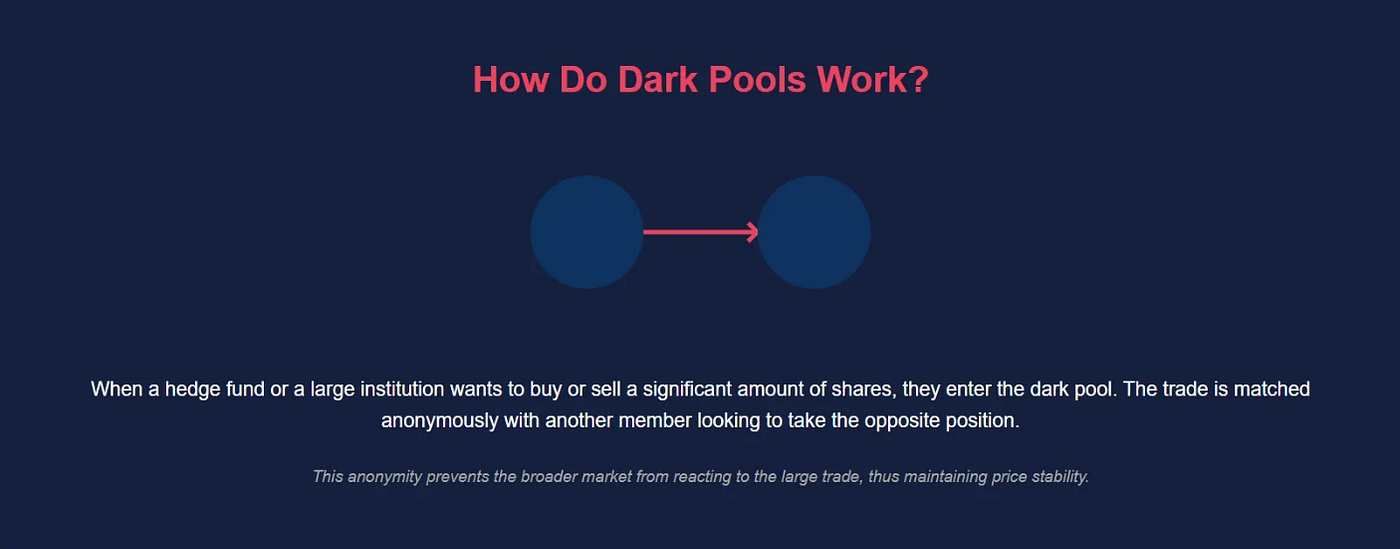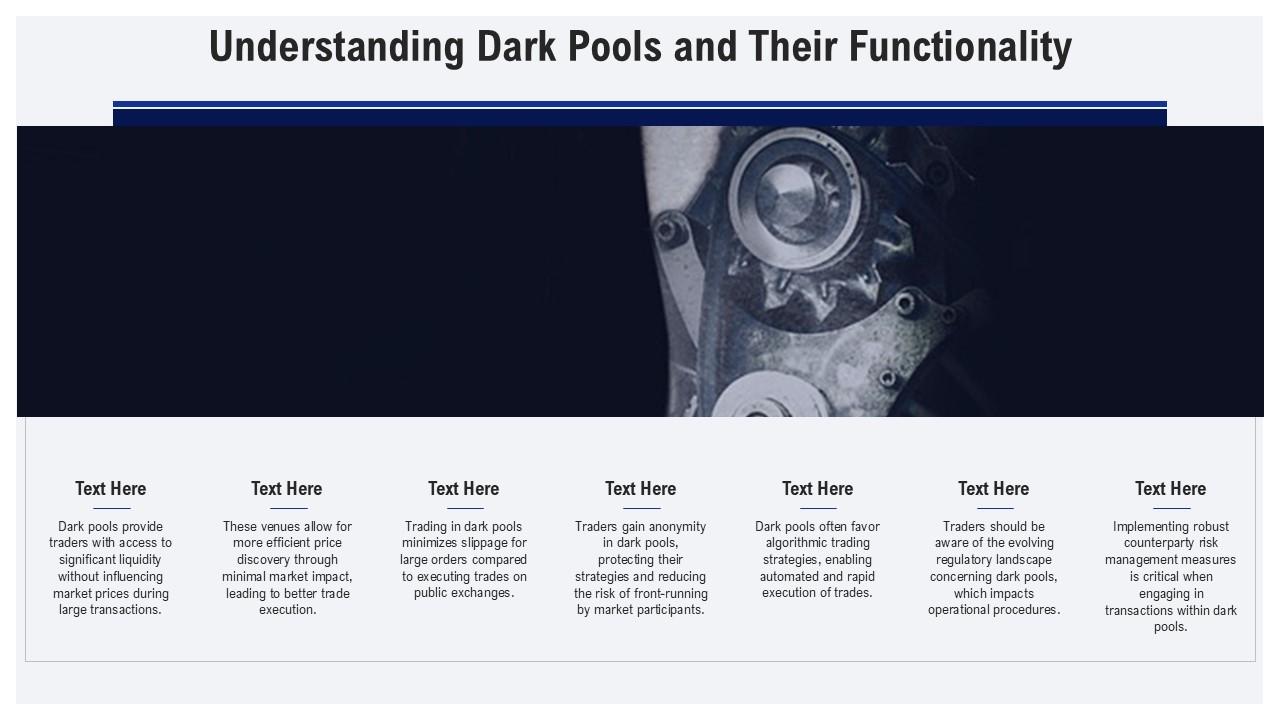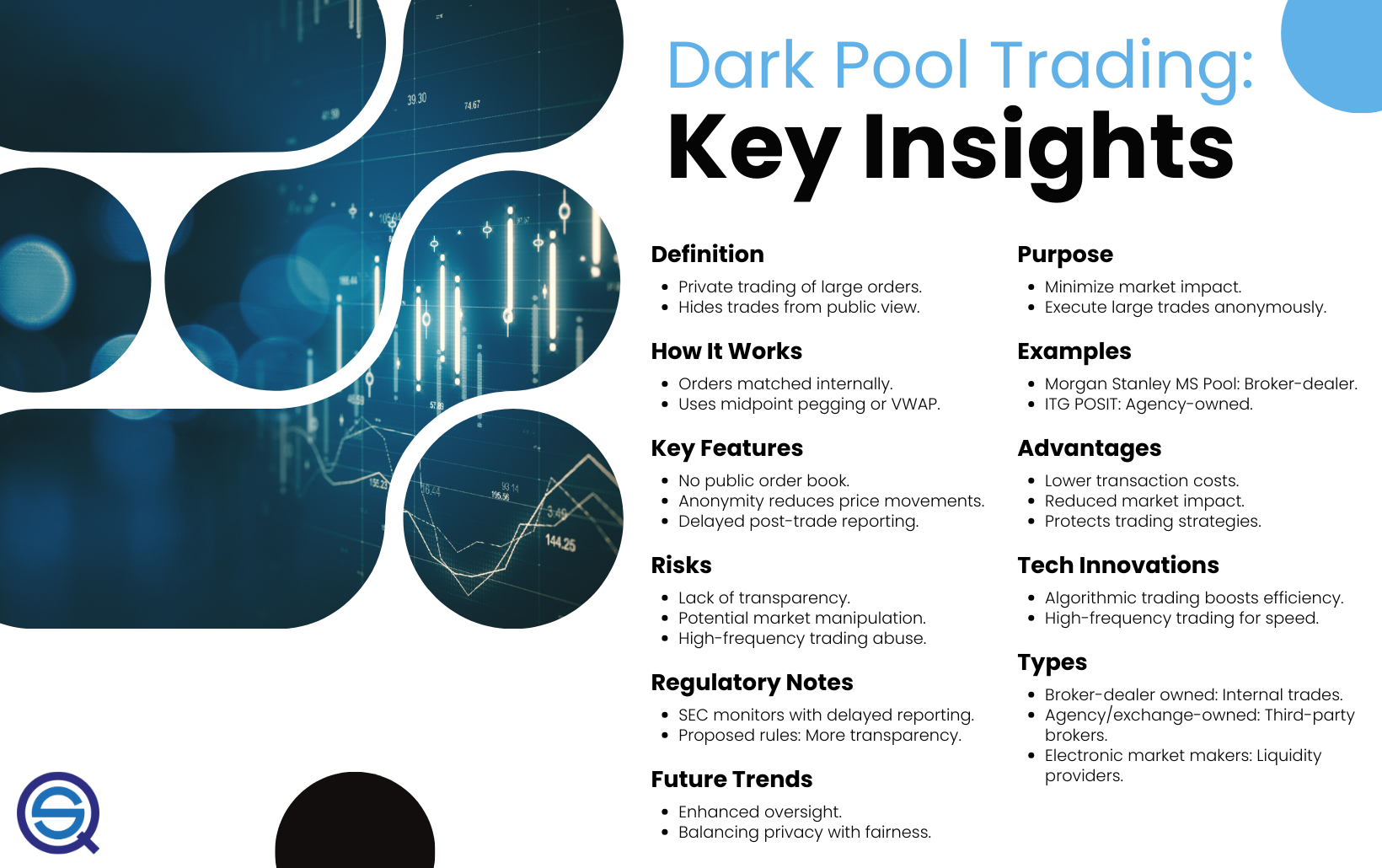Did you know that dark pools are like the secret speakeasies of the trading world, where traders can buy and sell without the bright lights of public exchanges? In this article, we dive into the complexities of trading in dark pools, covering everything from their legal status to the risks involved. You'll learn how dark pools differ from traditional exchanges, the importance of identifying trustworthy platforms, and effective strategies for safe trading. We also explore how order placement can affect your trades, the regulations that govern these mysterious venues, and how they impact market prices. Plus, we’ll shed light on the tools you need to navigate dark pools and tips for avoiding scams. Whether you’re a seasoned trader or just starting out, understanding these elements is crucial for successful trading in dark pools. Join us at DayTradingBusiness as we help you unlock the potential of this unique trading environment!
What are dark pools in stock trading?
Dark pools are private stock trading platforms where large investors buy and sell shares away from public markets. They hide orders from the public to prevent market impact and get better prices for big trades. Trading in dark pools can be risky and complex, so it's crucial to follow legal rules and use reputable platforms. Always stay compliant with regulations and avoid manipulative practices.
How do dark pools differ from traditional exchanges?
Dark pools are private trading venues where large orders are executed away from public markets, unlike traditional exchanges that display all trades openly. They offer less market impact and lower visibility, reducing the risk of price movements caused by big trades. In contrast, traditional exchanges are transparent, with real-time order books accessible to everyone. Dark pools are mainly used by institutional traders to hide their strategies, while retail traders rely on public exchanges. Trading in dark pools requires careful adherence to regulations, as they are less regulated and can pose risks like lack of transparency.
Are dark pools legal for retail traders?
Dark pools are legal for retail traders, but access is limited. They are primarily designed for institutional investors. Retail traders can’t directly trade in dark pools but can access similar liquidity through certain brokerage platforms that offer dark pool order routing. Always check if your broker provides dark pool trading options and ensure compliance with regulations.
What risks are involved in trading in dark pools?
Trading in dark pools risks including lack of transparency, increased potential for market manipulation, and limited regulatory oversight. You might face less price discovery, leading to hidden costs or unfavorable fills. There's also the risk of front-running or collusion among large traders. Additionally, sudden price swings can occur due to low liquidity. Using dark pools without proper safeguards can expose you to legal issues if rules are violated.
How can I identify trustworthy dark pools?
Look for dark pools operated by major, reputable firms like NYSE or Nasdaq. Check their transparency—trustworthy dark pools disclose order flow and fair pricing. Use industry tools or broker platforms that vet dark pools for regulatory compliance. Avoid pools with suspiciously low fees or opaque practices. Research their regulatory history and reviews from other traders. Stick to well-known dark pools with established track records for fair, legal trading.
What are the best strategies for safe dark pool trading?
Use strict order size limits to avoid revealing your intentions. Monitor dark pool activity and price movements closely. Diversify trades across multiple venues to reduce exposure. Stay compliant with all regulations and avoid manipulative tactics. Maintain transparency with your broker about your trading plans. Use algorithms designed for discreet execution to minimize market impact. Keep detailed records of all dark pool trades for compliance and review. Always stay informed about legal updates and best practices in dark pool trading.
How does order placement affect dark pool trading?

Order placement affects dark pool trading by influencing how your trades are executed quietly and discreetly. Large orders broken into smaller pieces reduce market impact, making trades less visible to the public and minimizing price movements. Using limit orders ensures you control the price, preventing unfavorable fills. Timing your orders during periods of low volatility or high liquidity helps avoid detection. Proper order placement strategies allow traders to access dark pools safely and legally, reducing the risk of signaling their intentions and avoiding regulatory scrutiny.
What regulations govern dark pools?
Dark pools are regulated by the SEC under Regulation ATS, which requires transparency and fair access. They must register as alternative trading systems (ATS) and comply with rules to prevent market manipulation. FINRA also oversees dark pool operators, enforcing rules on fair trading and disclosure. These regulations aim to ensure dark pools operate transparently and do not harm market integrity.
Can dark pool trading impact market prices?
Yes, dark pool trading can impact market prices by influencing supply and demand without revealing intentions, leading to potential price movements when large orders are eventually disclosed.
How do dark pools protect trader anonymity?

Dark pools protect trader anonymity by executing trades away from public exchanges, preventing market participants from seeing order sizes or identities. They use encrypted, private systems that hide the origin of large orders, making it difficult for others to track or front-run trades. This confidentiality allows traders to buy or sell large blocks without impacting the market price or revealing their intentions.
What tools or platforms facilitate dark pool trading?
Platforms like Liquidnet, ITG Posit, and BlockCross enable dark pool trading. Major brokerage firms such as Goldman Sachs, Morgan Stanley, and Citadel Securities also operate private dark pools. Additionally, electronic trading platforms like NASDAQ’s Dark Pool, BATS Dark Pool, and NYSE Arca Dark Pool provide venues for dark pool transactions.
How can I avoid scams in dark pool trading?
To avoid scams in dark pool trading, stick to reputable brokers with strong regulatory oversight. Verify the dark pool's transparency and ensure it discloses trade details. Never share sensitive information or make quick decisions based on pressure. Use limit orders to control execution prices and avoid market orders that can be manipulated. Keep your trading activity consistent and avoid suspiciously large or frequent trades. Educate yourself on dark pool mechanics and stay updated on regulatory changes to spot potential scams early.
Are dark pools suitable for all trader types?
No, dark pools are not suitable for all trader types. They mainly benefit institutional traders and large investors due to high minimum trade sizes and lower transparency. Individual traders typically lack access and may face greater risks, like less liquidity and potential price impact. If you're a retail trader, dark pools generally aren’t designed for your trading strategies.
What are the benefits of trading in dark pools?

Trading in dark pools offers benefits like reduced market impact, allowing large orders to execute quietly without moving the price. It provides access to liquidity not visible on public exchanges, helping traders execute big trades efficiently. Dark pools can offer better pricing and execution speed, especially for institutional investors, while maintaining confidentiality.
How do algorithms influence dark pool trades?
Algorithms drive dark pool trades by automatically matching buy and sell orders, often faster and more discreet than public markets. They analyze market data to execute large trades quietly, minimizing price impact. Algorithms can also identify optimal entry and exit points, helping traders hide their intentions. However, aggressive or manipulative algorithms can distort dark pool prices or create unfair advantages, risking legal issues. Using well-designed, compliant algorithms ensures dark pool trading remains safe and within legal boundaries.
What should I consider before trading in dark pools?
Before trading in dark pools, consider the lack of transparency and potential for less regulatory oversight. Understand the specific rules and fee structures of each dark pool. Evaluate how trading there might impact your market visibility and price impact. Check if your broker has experience and a good reputation with dark pool trading. Be aware of the risk of information leakage and potential conflicts of interest. Ensure your trading strategy aligns with dark pool liquidity and that you’re compliant with all legal regulations.
Conclusion about Strategies for Trading in Dark Pools Safely and Legally
In conclusion, trading in dark pools presents unique opportunities and risks that require careful consideration. Understanding the differences between dark pools and traditional exchanges, as well as the legal regulations governing them, is crucial for retail traders. By employing effective strategies and utilizing reliable tools, you can navigate the complexities of dark pool trading safely. For more in-depth insights and support on this trading method, DayTradingBusiness is here to assist you in making informed decisions.